Scholar Alumni
ARCS Scholar Alums, Let's Connect!
You are a vital part of our mission. Your stories encourage current scholars and help us attract new funding for future scholars.
Stay connected with ARCS® Foundation members and other scholars. If you have moved to the Phoenix area, we welcome you to speak to us about your research at an ARCS Foundation event; arrange a lab tour; visit your workplace; and/or send us an email with updates and photos . If you live outside the Phoenix area, we welcome you to send us an email with updates and any photos for our website.
To notify the Phoenix Chapter, please email us at phoenix@arcsfoundation.org. To update your contact information, navigate to the Member & Scholar login. To learn more about speaking at or hosting an event, click here.
Where are they now? Alumni updates - November 2024
Marina Mancuso, the Ralph and Sandra Matteucci Scholar for two years, graduated in December, 2023 from ASU and is working at Los Alamos National Laboratory in New Mexico. She is very grateful to continue her relationship with her sponsor Sandra Matteucci beyond her time as a Scholar.
Angela Taravella Oill is an active member of the ARCS Phoenix Chapter and is currently a computational scientist at TGen. Working in the Banovich Lab, she is helping to understand the response to a particular type of immunotherapy (CAR-T cell therapy) in patients with glioblastoma using single-cell RNA sequencing.
Joshua Daymude, a Johnston Scholar, PhD in 2021 at ASU, took a position at the Biodesign Center of Biocomputing, Security and Society at ASU and shares an appointment with ASU’s School of Computing and Augmental Intelligence.
Where are they now? Alumni updates - March 2023
Jennapher VanGlider Lingo, a Spetzler sponsored scholar 2018-2020, finished her PhD remotely from Memphis in 2021 while homeschooling her 2 children.She accepted a remote postdoctoral research scholar position with Dr. Scott Beeman’s Quantitative in vivo MRI Lab at ASU and has 2 manuscripts in preparation within her 1st year. She is excited to report that she just accepted an in-person postdoctoral position with the Radiation Oncology Department at St. Jude Children’s Research Hospital and will begin that position in January. Jennapher states that she is sincerely grateful for the support from the Phoenix ARCS Chapter and that the financial assistance relieved some of the burden associated with childcare costs and was critical in her retention in the PhD program.
Samantha Scibelli, a UA Lawson ARCS Scholar, accepted a post-doctoral position as a Jansky Fellow at the National Radio Astronomy Observatory (NRAO) in Charlottesville, VA, This is a prestigious national fellowship for radio astronomers that will allow her to lead her own independent research projects. She is very excited about this opportunity. Her husband has accepted a fellowship position at the University of Virginia’s Astronomy department and they are thrilled to have been offered their dream jobs in the same city. She extends a big thank you to Jane Lawson and Bruce and the ARCS Foundation for all the support!
Jeffrey Kane, a NAU ARCS Scholar and graduate 2012, is a faculty member in the Forestry and Wildland Resources Department of Humbolt University . In an effort to address California’s daunting wildfire challenges, Dr. Kane and the Humbolt Fire Resilience Institute recently acquired a $500,000 California Fire Workforce Development Grant. Through these funds and through the partnership of local agencies and organizations, they will work to develop and better integrate education, training, experience and outreach opportunities for the fire students, professionals and community members within Northwestern California. The major aim of this work is to enhance the qualified fire and fuels management workforce to help reach the ambitious but necessary fuel resolution targets for California in the coming years.
Northern Arizona ARCS Alumni Updates October 2019
After successfully defending their Ph.D.’s in Biology at Northern Arizona University, Rachel Rubin and Molly Schuman Goodier took the summer off to clear their heads and hiked 260 miles of the Colorado Trail for three weeks with their dog, Juniper.
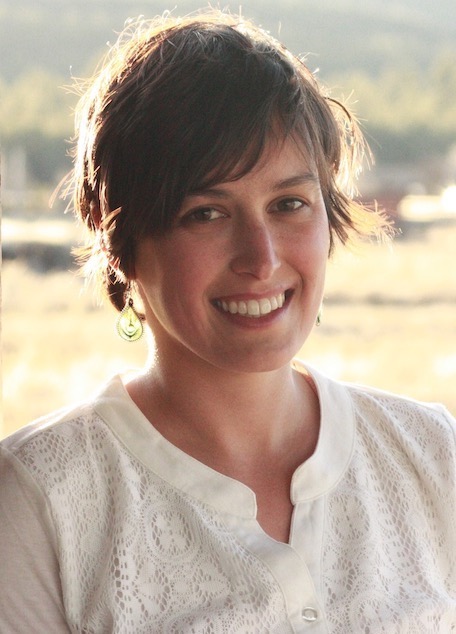 Rachel noted that it was amazing to spend lots of time outside and to process everything! As a postdoc, she is working in the Restoration Ecology Program at Mount Holyoke. Cranberry farming in New England is no longer lucrative for small family farms, so there are thousands of acres that are either getting abandoned or will be abandoned soon. While it’s sad that this large part of the New England cultural heritage is fading, it also offers a huge opportunity for rewilding lost habitat. Many of the cranberry farms are on the coast near Cape Cod, so they have high ecological importance. One of the sites, Tidmarsh, was the largest wetland restoration project in the Northeast. The work she is doing there, focusing on nutrients and microbes, will be used to garner support and funding for addition restoration projects.
Rachel noted that it was amazing to spend lots of time outside and to process everything! As a postdoc, she is working in the Restoration Ecology Program at Mount Holyoke. Cranberry farming in New England is no longer lucrative for small family farms, so there are thousands of acres that are either getting abandoned or will be abandoned soon. While it’s sad that this large part of the New England cultural heritage is fading, it also offers a huge opportunity for rewilding lost habitat. Many of the cranberry farms are on the coast near Cape Cod, so they have high ecological importance. One of the sites, Tidmarsh, was the largest wetland restoration project in the Northeast. The work she is doing there, focusing on nutrients and microbes, will be used to garner support and funding for addition restoration projects.
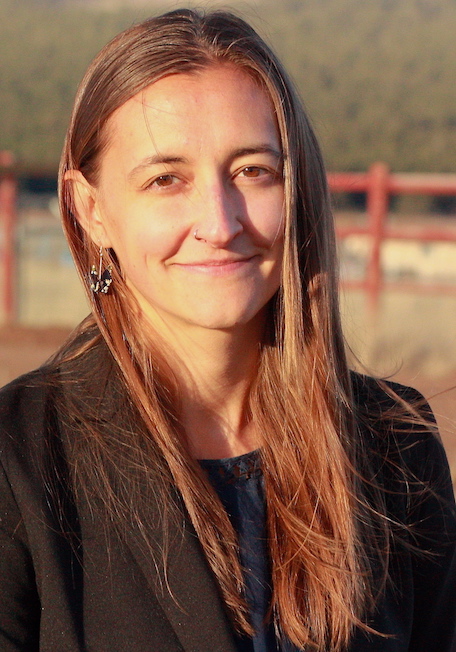 After their adventure, Molly Shuman Goodier recently took a permanent job working as a biologist with the EPA in Washington D.C. Her work is focused on evaluating the risk of new and existing chemicals on ecological health (fish, amphibians, insects, etc.). She is excited about the opportunity to connect her science with pretty large-scale decisions that she hopes may make a difference. The work in this part of the EPA is all based on a law that was passed in 2016 to amend the Toxic Substance Control Act, and improve the way we regulate chemical safety in the United States. Molly wants ARCS members to know that she is very grateful for the support she received from ARCS Foundation Phoenix Chapter. She hopes to stay in touch with ARCS members. She also hopes there are many new Biology Ph.D. candidates that may receive and benefit from the scholar award, as she did.
After their adventure, Molly Shuman Goodier recently took a permanent job working as a biologist with the EPA in Washington D.C. Her work is focused on evaluating the risk of new and existing chemicals on ecological health (fish, amphibians, insects, etc.). She is excited about the opportunity to connect her science with pretty large-scale decisions that she hopes may make a difference. The work in this part of the EPA is all based on a law that was passed in 2016 to amend the Toxic Substance Control Act, and improve the way we regulate chemical safety in the United States. Molly wants ARCS members to know that she is very grateful for the support she received from ARCS Foundation Phoenix Chapter. She hopes to stay in touch with ARCS members. She also hopes there are many new Biology Ph.D. candidates that may receive and benefit from the scholar award, as she did.
Congratulations to our ARCS Foundation Phoenix 2016-2017 Scholars
Click on 2016-2017 ARCS Foundation Phoenix Scholars to view our awardees.
Congratulations to our ARCS Foundation Phoenix 2015-2016 Scholars
Click on 2015-2016 ARCS Foundation Phoenix Scholars to view our awardees.
Congratulations to our ARCS Foundation Phoenix 2014-2015 Scholars
Dr. Gary F. Moore, ASU ARCS Scholar Alum, Joins Arizona State University Faculty
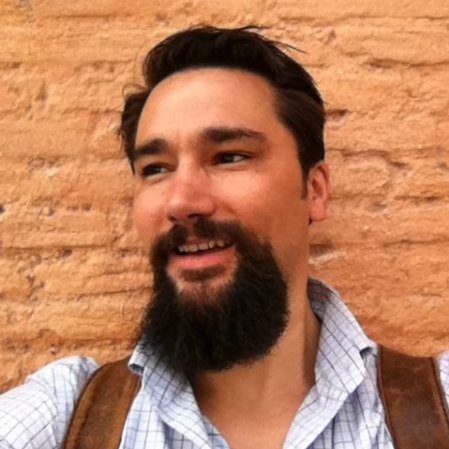 Gary F. Moore, Ph.D. and ARCS Scholar Alum, recently accepted a faculty position at Arizona State University in Tempe. His new position as Assistant Professor, Department of Chemistry and Biochemistry represents advancement in his scientific career and research direction. Dr. Moore says, "I remain thankful for the early support I received from ARCS Foundation as a Might/ARCS Scholar and believe this appointment underscores the importance of ARCS work encouraging promising scientists early in their educational endeavors, building U.S. competitiveness, and advancing science. I look forward to future opportunities to support ARCS Foundation so that others may benefit from the experiences I was fortunate to have." Prior to his position at ASU, Gary was a staff/principal investigator at Berkeley Labs. Click here to read a report on his research, while working at Berkley Labs.
Gary F. Moore, Ph.D. and ARCS Scholar Alum, recently accepted a faculty position at Arizona State University in Tempe. His new position as Assistant Professor, Department of Chemistry and Biochemistry represents advancement in his scientific career and research direction. Dr. Moore says, "I remain thankful for the early support I received from ARCS Foundation as a Might/ARCS Scholar and believe this appointment underscores the importance of ARCS work encouraging promising scientists early in their educational endeavors, building U.S. competitiveness, and advancing science. I look forward to future opportunities to support ARCS Foundation so that others may benefit from the experiences I was fortunate to have." Prior to his position at ASU, Gary was a staff/principal investigator at Berkeley Labs. Click here to read a report on his research, while working at Berkley Labs.
Congratulations to our ARCS Foundation Phoenix 2013-2014 Scholars
Click on 2013-2014 ARCS Foundation Phoenix Scholars to view our awardees.
Dr. Dave Crowder, ARCS Phoenix Alumni Scholar, Updates His Status
Since my time as a PhD Student at the University of Arizona, during which time I was funded by ARCS Phoenix from 2005 to 2008, I moved onto a postdoctoral position at Washington State University. After a couple of years, I moved into a faculty position in the Department of Entomology at the same University. My work has primarily focused on issues relating to sustainable agriculture, and has been published in top journals such as Nature, Nature Biotechnology, and Proceedings of the National Academy of Sciences. This work has also been featured in news outlets such as the New York Times and Seattle Times. As a professor, I hope to be able to involve some of my students in ARCS through the Seattle Chapter. ARCS funding was vital to my professional and personal development, and I am forever indebted to the organization for its support.
Thanks,
Dave Crowder
Assistant Professor
Washington State University
dcrowder@wsu.edu
http://entomology.wsu.edu/david-crowder/
Congratulations to our ARCS Foundation Phoenix 2012-2013 Scholars
Click on 2012-2013 ARCS Foundation Phoenix Scholars to view our awardees.
NAU Scholar Alums Dr. Jeffrey Kane, Dr. Daniel Laughlin and Dr. Liz Kalies Re-Connect!
The following NAU Scholar Alum updates are courtesy of Dr. James Allen, Professor and Executive Director, School of Forestry
College of Engineering, Forestry and Natural Sciences, Northern Arizona University
Dr. Jeffrey Kane graduated in May 2012 and is now a member of the forestry faculty at Humboldt State University. Here’s a link to his HSU website. Jeff recently co-authored a journal article that was published in a major international journal and acknowledges ARCS Foundation support on page 7.
Dr. Daniel Laughlin graduated in May 2009 and is now a faculty member at the University of Waikato in New Zealand. Daniel is also in the process of developing a joint research proposal to the National Science Foundation with ARCS alumni Jeff Kane. It is great to hear that these ARCS Alumni are collaborating in their new roles as faculty members. Here’s a link to Daniel's UW website.
Dr. Liz Kalies recently checked in from from Chapel Hill, North Carolina. She has accepted a job with Bayer CropScience as a research scientist. The plan is to continue doing wildlife population/community modeling, but rather than studying the impacts of forest management, she'll be looking at the impacts of chemicals. Her job will be to help Bayer mitigate risk to animals and terrestrial ecosystems from the various agricultural pesticides that it manufactures. She notes that it will be an opportunity to work behind the scenes to protect wildlife at potentially large scales.
Congratulations to our ARCS Foundation Phoenix 2011-2012 Scholars
Click on 2011-2012 ARCS Foundation Phoenix Scholars to view our awardees.
UA Alum Scholar Dr. Amy Winkler and ASU Alum Scholar Dr. Dan Farrell Re-Connect!
Updates from Dr. Amy Winkler to Phoenix Chapter President Anna Maria Matteucci
Dear Anna Maria Matteucci,
Thank you for your beautiful note! ARCS helped me financially when I needed it and I want to pay that forward as I become more financially capable. As mentioned in your note, here's an update about what I've been up to and a current photo is attached.
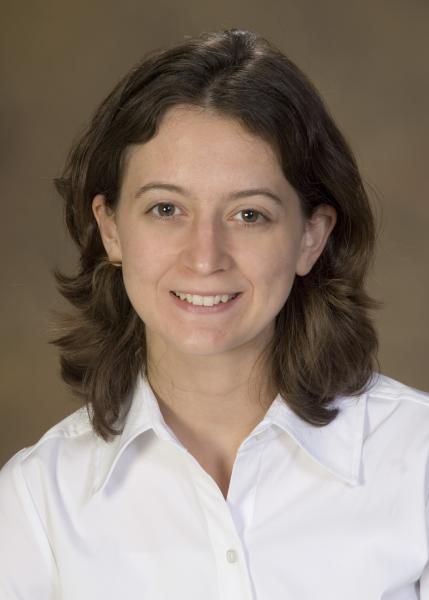 I graduated from The University of Arizona back in May 2010 as my class valedictorian in the College of Optical Sciences. I am now working as a postdoctoral researcher at Washington University in St. Louis. My lab is dedicated to pushing a new biomedical imaging tool called photoacoustic microscopy to the limit. Photoacoustic microscopy combines optical imaging with ultrasound to see deeper into the body noninvasively and to see more detailed structures. This is useful for many applications, such as cancer detection and treatment of chronic pain. This technology has started coming into its own in the past 5 years and our goal is to explore all the new biomedical applications enabled by this technology.
I graduated from The University of Arizona back in May 2010 as my class valedictorian in the College of Optical Sciences. I am now working as a postdoctoral researcher at Washington University in St. Louis. My lab is dedicated to pushing a new biomedical imaging tool called photoacoustic microscopy to the limit. Photoacoustic microscopy combines optical imaging with ultrasound to see deeper into the body noninvasively and to see more detailed structures. This is useful for many applications, such as cancer detection and treatment of chronic pain. This technology has started coming into its own in the past 5 years and our goal is to explore all the new biomedical applications enabled by this technology.
Postdoctoral researchers are notorious short-timers. In fact, the maximum amount of time one can be a postdoc here is 5 years. So, it seems like every other day someone asks me what am I doing here? and what's my goal for the future? Well, I'm here because I think it's the best place for me to learn to become a better scientist, doing meaningful research. I'm working with very capable and intelligent researchers who challenge me to become more productive. My goal for the future is to continue to branch out, challenge myself, and work towards expanding our knowledge of how to become and keep ourselves HEALTHY.
From my perspective as an ARCS alumna, ARCS is in the business of promoting students in research. After spending hours in the lab or at my computer, I feel the need to reconnect with the reason I'm doing what I'm doing. The people who participate in ARCS are so good at providing that affirmation through their active interest and their generosity. I received the ARCS award for 3 years starting from my second year in graduate school, and I'm so grateful to have had that support. I wish ARCS continued success in promoting and affirming students in research.
Best Regards,
Amy Winkler
Ph.D. Optical Sciences
Updates from Dr. Dan Farrell to Phoenix Scholar Award Donors Diane and Tom Might
Dear Diane and Tom,
Thank you so much for coming to my dissertation defense presentation last September! And thanks so much for your gift! You guys are the greatest. It meant a lot to have you there and I was so glad you could hear about my research.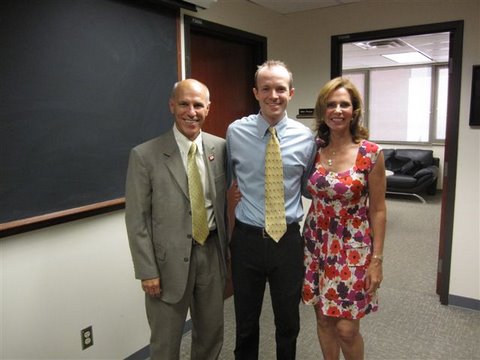
I'm living in New York now, where I am doing my post-doc at Stony Brook University. My post-doc adviser, Ken Dill, is the director of a new centr for physical and quantitative biology here at SBU. My research is developing cell-level models of protein creation, folding, degradation, and aggregation. Understanding how cells keep all these activities properly banlanced is critical for understanding soituations like cncer and aging, where these processes become corrupted. I'm working with new colaborators at Scripps (San Diego) and U Mass. It's an exciting time. Miss you and hope our paths cross again someday!!
Dan Farrell
